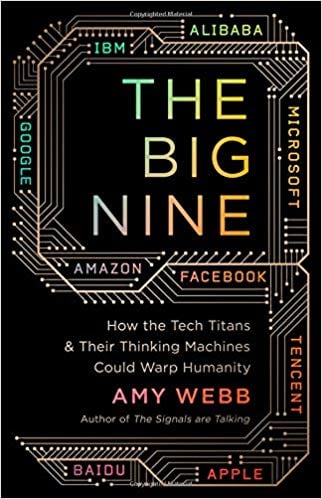You have /5 articles left.
Sign up for a free account or log in.
 The Big Nine: How the Tech Titans and Their Thinking Machines Could Warp Humanity by Amy Webb
The Big Nine: How the Tech Titans and Their Thinking Machines Could Warp Humanity by Amy Webb
Published in March of 2019.
We need to get Amy Webb to campus. This is one of those cases where organizing discussions of the book would be great - but not enough. We would be wise to engage with Webb directly.
The reason is that while The Big Nine is a book about corporate artificial intelligence (AI), it is also a book about higher education. Webb puts much of the responsibility for the algorithmic biases surfacing in AI platforms squarely on the failure of universities to integrate ethics training within computer and data science programs.
It is fine to blame the big tech companies for producing platforms that are utilized to systematically disadvantage underrepresented groups, such as the algorithms that underlie an increasing number of computer-generated decisions. Examples of AI bias can be found in areas as diverse as hiring and recruiting (bias in resume sorting), credit and banking, and automatic medical diagnostics. Webb has lots to say about where the largest tech companies are falling short in these areas.
Blaming the tech companies for the problems of AI implementation, however, risks missing the root causes of the problem. In failing to train a diverse set of future computer and data scientists, and in privileging only hard analytical and computations skills over a broader set of liberal arts courses in the curriculum, universities are perpetuating structural AI based inequalities.
We need more books like The Big Nine that are critical of higher education for reasons beyond politics (liberal bias) or costs. The critique of higher education for failing to integrate ethics into undergraduate and graduate programs in CS and machine learning and data science was one that I had not thought about. I’d hypothesize that liberal arts colleges do this better than most. But this is worth discussing.
Beyond the discussions of universities and the pipelines into the companies profiled in the book, The Big Nine offers a fascinating set of scenarios for how the future of AI will play out over the next 50 years. Webb offers three scenarios: optimistic, pragmatic, and catastrophic.
In the optimistic scenario, the G-MAFIA (Webb’s term for the US companies of Google, Microsoft, Amazon, Apple, IBM, and Facebook) have leveraged AI to responsibly offer new services while also protecting privacy. Personal data records (PDRs) are portable across platforms, private, and useful in reducing friction in commerce and education and healthcare.
In the pragmatic scenario, which Webb thinks is the most likely, AI offers some benefits to some people - but at significant costs. On a daily level, Webb predicts that individuals and organizations will increasingly be forced to choose which G-MAFIA AI ecosystem to adopt. We will either be Google homes or Amazon homes or Apple homes. Our appliances will all be smart appliances, but our Apple TV will not be able to work with our Amazon fridge or our Google phone. Couples who are not on the same corporate OS will be incompatible.
The catastrophic scenario is one of widespread job losses in information professions (far fewer professors and doctors and lawyers), combined with diminishing US power and influence. China’s national strategic AI policy has paid dividends, allowing the country to leapfrog the US in digital combat capabilities. Privacy has a concept has all but disappeared, as companies track every behavior and action, excluding many from employment and medical insurance.
The chapter length scenarios of the possible impacts of AI are provocative, informative, and great fun. It is fascinating to contemplate running a similar optimistic/pragmatic/catastrophic scenario planning exercise for the future of AI on higher ed.
The Big Nine is an essential book for anyone interested in a global perspective around the role of companies and governmental policies in determining technological change.
The Big Nine is an excellent complement to books such as Prediction Machines, AI Superpowers, The Four, The Fourth Age, Uberland, Thinking Machines, Humans Need Not Apply, Machines of Loving Grace, and Weapons of Math Destruction.
And really, we should be inviting Webb to speak at our schools.
What books on AI and the future (beyond those mentioned above) might you recommend?
Where are you on the optimistic/pragmatic/catastrophic continuum for the future impact of AI?
What are you reading?




